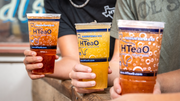Article
Bojangles' plays chicken with the competition
In the first quarter of 2006, the chain has signed 132 franchise commitments with 62 expected to close within 60 days.

April 2, 2006 by Julie Sturgeon — independent journalist, CEOEditor, Inc.
Executives at Charlotte, N.C.-based Bojangles' Restaurants are dancing at the latest numbers to hit their desks. In the first quarter of 2006, they have signed commitments for 132 new franchise restaurants with 62 expected to close within 60 days. Better yet, company stores – which represent one-third of the system and typically tends to lag behind the franchises – have seen sales averages increase for the 10th consecutive quarter. That means the franchise average annual sales are just a hair below $1.6 million, while the company stores rake in $1.25 million.

Chief executive officer Joe Drury said March 2006 posted some of the best sales in Bojangles' history.
"I have been with the company for 21 years, and I haven't seen a time when all cylinders are firing quite the way they are right now," said Eric Newman, executive vice president and general council at Bojangles'.
That makes 2006 a good time to take a chance, in the chain's book. On the small potatoes side, the company is rotating new items off and on the menu, such as catfish, shrimp dinners, jambalaya and wraps. Catfish in particular played well in the corporate units, where some even ran out of product during the first run. Overall company sales are up 5 percent over comparable sales last year during the tests. "Not many QSRs can say that right now," Drury said.
On a larger scale, the chain is also rolling out a fledgling international program. It jumped on the chance to partner with Corporación Rocafirme in June 2003 to open first fast-food franchise on the Honduras'-owned Roatan Bay Island. Only one competitor has followed to date, and according to Newman, Bojangles' has doubled that chain's sales. Bojangles' expects to have five units in Honduras by the end of 2006.
The chain opened its first China unit in Tianjin in January 2005, and all systems are go to launch in Pueblo, Mexico, in late May. Franchisee partner Mexicajun Investment Group has agreed to open 10 restaurants in that area.
 |
Despite rising real estate costs, Bojangles' plans to keep its current store model. |
"You don't have to be among the mega-companies to succeed, I am convinced, in international markets," Newman said.
For starters, in Asia, Latin America and the Caribbean, chicken is the choice over hamburgers, so familiar names like McDonald's have had to adjust their sales emphasis, he claimed. Second, Bojangles' spicier flavor appeals to palates overseas, so "we will continue to grow in the United States, but who is to say that Mexico is not a better place for our brand than, say, Minnesota?" Newman said. His goal is to see a balance of 15 to 20 percent of the brand's units in foreign markets.
And despite the fact the Roatan market proved so beneficial, he isn't losing sleep over the fact that Bojangles' is hardly the first to build in places like China, where KFC is the juggernaut.
"As those markets mature, people are looking for choice. They want to try new things and get a taste of the good life, an American experience," he said. "Whatever the politics of the world today, people have a real desire for American culture."
Overseas profits can, however, include oversized headaches like differences in languages and laws, plus restrictions on imports. The restaurant failed to penetrate into Trinidad several years ago. Negotiations fell off when the population statistics reared their head: 40 percent of the country is East Indian descent, of which half are Muslim and half are Hindu. It boiled down to 20 percent of the country won't eat beef, and 20 percent won't eat pork.
 |
in June 2003, Bojangles' was the first fast-food franchise to open in Honduras'-owned Roatan Bay Island. |
"So when you are spreading your menu out, how do you appeal?" Newman said. He encountered the same situation while exploring India as a potential market.
Meanwhile, back in the United States, the cost of real estate has grown by staggering rates – to the point some concepts have been priced out of the free-standing market. Newman acknowledges the pressure to consider in-line as a solution, even though it, too, has become increasingly competitive to land the right location. Still, Newman doesn't foresee Bojangles' abandoning its current model, if only because unit sales support freestanding sites. "It just takes some of your margin for error away," he said.
And although the chicken franchise is not heavily represented in areas hit by Hurricane Katrina in 2005, Bojangles' is feeling the effects of those storms. The cost of construction materials shot up nearly 20 percent, plus demand for materials in China and India are strong a well.
"You can always look at the materials you are using but that's a tricky area because we have an image and a brand to protect," Drury said. "In the quick-service business, your image of what your building looks like on the outside is an important piece of who you are."
But perhaps the long-term challenge will continue to be labor costs, said Cam McRae, owner and president of Tands Inc., in Kingston, N.C., which owns 34 Bojangles' franchises. Because the concept calls for hand-breading, fresh chicken, coffee beans ground before every pot and fresh biscuits out of the oven every 20 minutes, it is a fast-casual attitude trapped in a QSR body. When he takes into consideration training costs as well, McRae estimates 30 percent of his total revenue goes to pay the labor portion of his operations. His average ticket is $5.
"The labor challenges are huge," McRae said. "It's kind of a double-edge sword, but if you execute well, then you really have a leg up over your competitors." Still, he's managed to do well in his 26 years as a Bojangles' franchisee. He has two units under construction and is toying with -taking on additional territory in another state. "I see a very bright future, both from a franchise level and with the company as a whole," he said.
Newman views the commitment to fast-casual quality as the quandary that could be this brand's ultimate trump card.
"Neat designations of concepts into segments isn't quite right," he said. "We overlap with fast casual, and that is part of the growth. The QSR format isn't going away, but neither is high quality. The restaurant emphasis is on uniqueness, freshness and flavor."
 ChatGPT
ChatGPT Grok
Grok Perplexity
Perplexity Claude
Claude








